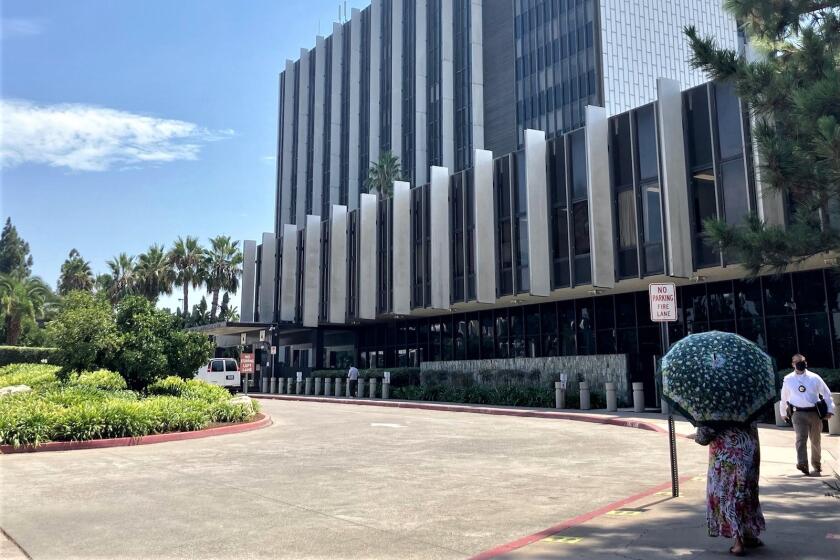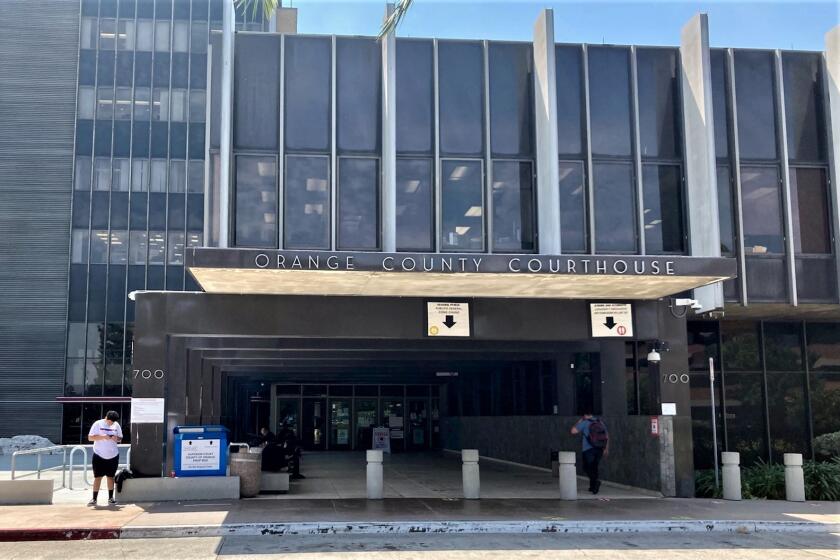Classically Trained: After years in the O.C. classical world, Corey set to retire
- Share via
LAGUNA HILLS — There were times in Dean Corey’s young life when an appreciation for great music was encouraged during his earliest waking hour.
His mother liked to awake him to the dignified sounds of the early 19th century — specifically, the symphonies of Beethoven, Ludwig van.
“I could have my breakfast if I could identify which movement it was,” Corey, 65, recalls with a smile from his home in Laguna Hills. “So I got that down, but then she started dropping a part randomly from any movement.”
It was an innovative way for the boy growing up in Arlington, Texas, to learn the great composer’s nine symphonies.
“To this day, I could tell you,” he says in his Texas accent. “You could play me two notes anywhere in any of the nine symphonies, and I’ll tell you where it is and in which movement.”
Such knowledge certainly comes in handy when Corey lectures about Beethoven, and it further adds to his depth of knowledge as president and artistic director of the Philharmonic Society of Orange County. Formed in 1954, the Irvine-based nonprofit serves as the county’s eminent presenter of music, often from the classical world of orchestras and chamber ensembles.
Corey oversees a staff of about 15 and a budget of around $4 million.
His job duties include overseeing the marketing efforts, networking, coordinating with arts managers and navigating the world of donors and their donations.
“You raise the money by yourself,” he says. “We have no guarantees of anything. On July 1, all the counters go back to zero and you have to raise that first dollar all over again. It’s a precarious business.
“It’s kind of magical that it happens at all.”
Since 1993, Corey has acted as the face of the organization and is often seen giving a brief speech before concerts. That’s part of helping drive the brand home, he says, a brand that has no orchestra of its own yet has brought many of the world’s best to town.
All such musical efforts began with the influence of his parents. His father was a flute player and high school band director. His mother encouraged music as well.
Corey received his bachelor’s from the University of North Texas and a master’s from Yale, and had a professional French horn-playing career for groups that included the New York City Ballet Orchestra.
Eventually, though, he felt he might prefer the management side of the arts, not just the playing side.
“I felt I could do more of that building for an orchestra and running an orchestra better than I could just sitting in a horn section,” he says.
“When you’re a young musician, you don’t think about the music stand in front of your chair or the music on your stands,” Corey adds. “Someone had to get that. The audience manages to always show up at the same time to come to your concert. That just doesn’t happen automatically.”
Before coming to Orange County, he worked for the orchestras of Chattanooga, Tenn.; Jacksonville, Fla.; Rochester, N.Y.; and San Diego.
Corey says his favorite season at the Philharmonic Society was one of his earliest: 1995-96. It was the first season he had a full shot at organizing.
He made it diverse. It included opera singer Cecilia Bartoli, the Chicago Sinfonietta, a flamenco guitarist, a Korean percussion group and a tango outfit.
He also loved organizing the Eclectic Orange Festival, which started in 1999 and had a five-year run. In its first year, the lineup included blues and Rachmaninoff.
Corey notes that, for him, the music world has never been the same since 9/11. It changed audiences dramatically.
“After that, people no longer wanted to take a chance with things,” he says. “They wanted to know what they were getting before they went. They didn’t want to try anything new. It really changed that quickly.”
For Corey, his time in Orange County is approaching its end. Earlier this year, he announced his retirement in the summer of 2014 after some 40 years in the business.
And once Corey’s gone, it’s unlikely that patrons will be seeing him very often in O.C. concert halls.
He and his wife are moving to Gascony, France, to their one-acre lot with a restored house built in 1854. It’s the kind of place where the pace of life is slower and one can tell the time of day by the birds.
For the boy who grew up in the Lone Star State with Beethoven mornings, it’s been a fulfilling career.
“I love for people to feel as passionate about the music as I do,” he says. “If I can spread that around a little bit, I feel like I’ve done something.”
BRADLEY ZINT is a classically trained musician and a copy editor for the Daily Pilot. Email him story ideas at bradley.zint@latimes.com or follow him on Twitter @BradleyZint.
All the latest on Orange County from Orange County.
Get our free TimesOC newsletter.
You may occasionally receive promotional content from the Daily Pilot.




